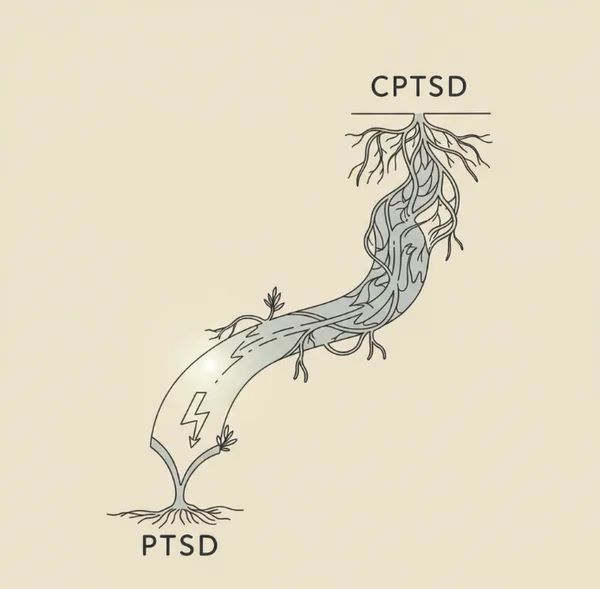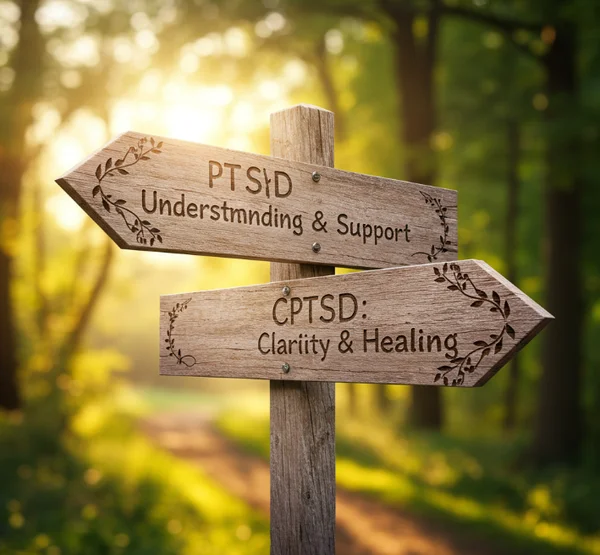CPTSD vs PTSD Test: Key Differences & Why Assessment Matters
May 17, 2025 | By Nora Hayes
Navigating the world of trauma-related conditions can be confusing. You might be experiencing distressing trauma symptoms and wondering if it's Post-Traumatic Stress Disorder (PTSD) or something more complex, like Complex PTSD (CPTSD). What is the difference between PTSD and CPTSD? Understanding these distinctions is crucial for gaining clarity and finding the right path forward. This article will explore the key differences and explain how a CPTSD vs PTSD test approach, like the assessments available on TraumaTest.org, can provide valuable initial insights. If you're trying to understand your experiences, exploring an assessment might be a helpful first step.

Understanding PTSD: Core Symptoms and Triggers
What is Post-Traumatic Stress Disorder (PTSD)? PTSD is a mental health condition that can develop after a person experiences or witnesses a terrifying event. The event might be a natural disaster, a serious accident, a terrorist act, war/combat, rape, or other violent personal assault.
What is Post-Traumatic Stress Disorder (PTSD)? A Brief Overview
PTSD is characterized by intense, disturbing thoughts and feelings related to the traumatic experience that last long after the event has ended. People with PTSD may relive the event through flashbacks or nightmares; they may feel sadness, fear, or anger; and they may feel detached or estranged from other people. A PTSD assessment often looks for these core indicators.
Key Symptom Clusters of PTSD (Re-experiencing, Avoidance, Negative Cognitions/Mood, Arousal)
According to diagnostic criteria (like the DSM-5), PTSD involves several distinct symptom clusters:
- Intrusion/Re-experiencing: Unwanted upsetting memories, flashbacks, nightmares.
- Avoidance: Avoiding trauma-related thoughts, feelings, or external reminders (people, places, activities).
- Negative Alterations in Cognitions and Mood: Negative thoughts about oneself or the world, distorted blame, persistent negative emotions (fear, guilt, shame, anger), inability to experience positive emotions, feeling detached.
- Alterations in Arousal and Reactivity: Irritability or aggression, risky or destructive behavior, hypervigilance, heightened startle reaction, difficulty concentrating, difficulty sleeping. Identifying these trauma symptoms is a key part of any PTSD diagnosis process, though our online tools are for screening, not diagnosis.
Typically Linked to Single-Incident Trauma
While not exclusively, PTSD is often associated with exposure to a single, distinct traumatic event or a series of clearly defined traumatic events over a shorter period. This is one of the areas where it can differ from CPTSD.
Delving into Complex PTSD (CPTSD): Beyond Standard PTSD
What are the symptoms of Complex PTSD? Complex PTSD, or CPTSD, is a condition that can develop following exposure to an event or series of events of an extremely threatening or horrific nature, most commonly prolonged or repetitive events from which escape is difficult or impossible. This often includes experiences like prolonged childhood abuse, domestic violence, or being a prisoner of war.
Defining Complex PTSD: When Trauma is Prolonged or Repeated
CPTSD arises from exposure to chronic ptsd-like conditions or repeated traumatic events over an extended period, often during critical developmental stages. The repetitive nature and the feeling of being trapped are key. A complex PTSD test or a broader trauma test aims to capture aspects of these prolonged experiences.
Additional CPTSD Symptoms: Difficulties with Self-Perception & Relationships
Beyond the core PTSD symptoms, CPTSD is characterized by severe and persistent:
-
Problems with affect regulation: Difficulty managing emotions, sometimes experiencing intense anger, sadness, or suicidal thoughts.
-
Disturbances in self-perception: Feelings of shame, guilt, or self-blame; feeling fundamentally different from others.
-
Difficulties in relationships: Trouble forming or maintaining healthy relationships, issues with trust and intimacy.

The "Disturbances in Self-Organization" (DSO) Criteria
The World Health Organization's ICD-11 includes CPTSD as a distinct diagnosis and highlights "Disturbances in Self-Organization" (DSO) as a core feature. These encompass the difficulties in affect regulation, self-concept, and relational functioning mentioned above. This distinguishes it from PTSD, which doesn't require these DSO features for diagnosis, although some overlap can occur. Exploring a cptsd quiz might touch upon these areas.
CPTSD vs PTSD: Spotting the Key Differences
Understanding the difference between PTSD and CPTSD is crucial for self-awareness and for seeking appropriate support. While both involve trauma, their characteristics and often their origins differ.
Nature of Traumatic Exposure (Single Event vs. Chronic)
- PTSD: Often linked to a single traumatic event or a series of distinct events over a shorter duration.
- CPTSD: Typically results from prolonged, repeated trauma, often interpersonal in nature (e.g., ongoing abuse, captivity), where escape is difficult.
Range and Type of Symptoms (Core PTSD + DSO in CPTSD)
- PTSD: Primarily involves symptoms related to re-experiencing, avoidance, negative mood/cognitions, and hyperarousal.
- CPTSD: Includes all core PTSD symptoms plus significant difficulties in self-organization (affect regulation, self-concept, and relationships). These DSO features are central to CPTSD.
Impact on Identity and Interpersonal Functioning
- PTSD: Can impact relationships and self-view, but these are not defining criteria in the same way as for CPTSD.
- CPTSD: Profoundly affects an individual's sense of self, their ability to trust, and their capacity for healthy relationships, often due to early or prolonged interpersonal trauma.
Why a Specialized CPTSD Test or PTSD Assessment Can Help
Taking a free CPTSD test or a comprehensive PTSD assessment online, like those offered at TraumaTest.org, can be a valuable first step. How do I know if I have CPTSD? While our tests don't diagnose, they can help you.
Gaining Initial Clarity on Your Symptom Patterns
An online trauma test can help you identify which trauma symptoms you might be experiencing and whether they align more with patterns seen in PTSD or CPTSD. This can bring a sense of validation and understanding to confusing experiences.

Understanding Which Path for Support Might Be More Relevant
Recognizing potential indicators of CPTSD versus PTSD can inform your search for professional help. Some therapists specialize in Complex PTSD, and treatment approaches may differ. For example, post traumatic stress disorder treatment might focus more on processing a specific event, while CPTSD treatment often involves longer-term work on self-regulation, identity, and relational skills.
Using TraumaTest.org's Free Assessment Tools
Our platform provides free, anonymous screening tools to help you explore these complex issues. Whether you're looking for a general trauma assessment or something more specific like a complex PTSD test, our goal is to provide accessible resources for self-reflection. Explore our assessments today.
Limitations of Online Trauma Tests
It's crucial to understand the role and limitations of any online trauma test, including a CPTSD test or PTSD assessment.
Screening Tools, Not Diagnostic Instruments
These online tests are designed as screening tools. They can help identify potential symptoms and areas of concern based on your self-reported experiences. They are not a substitute for a clinical diagnosis made by a qualified mental health professional.
The Necessity of Professional Evaluation for Diagnosis
A formal PTSD diagnosis or CPTSD diagnosis can only be made by a trained clinician (like a psychologist, psychiatrist, or licensed therapist) after a comprehensive evaluation. This typically involves a clinical interview, and sometimes other assessment measures.
Navigating Your Path: Use Our Tests for Initial Insight
Understanding whether your experiences align more with PTSD or the broader scope of CPTSD can be an important step in your journey towards healing. While a CPTSD vs PTSD test online provides preliminary insights, the ultimate goal is to empower you with information to make informed decisions about seeking further support. Remember, recognizing these patterns is not about labeling, but about understanding and compassion.
We encourage you to use the resources at TraumaTest.org as a starting point for self-reflection. What are your thoughts on the importance of differentiating these conditions? Share your general insights in the comments below.

CPTSD and PTSD Test Queries Answered
-
Can I have both PTSD and CPTSD?
According to the ICD-11 (which formally recognizes CPTSD), if the criteria for CPTSD are met, this diagnosis is given instead of PTSD. However, it's acknowledged that an individual with CPTSD will also meet the criteria for PTSD. The key is the presence of the additional "Disturbances in Self-Organization" for a CPTSD diagnosis.
-
Is the free CPTSD test on TraumaTest.org reliable for self-assessment?
Our free CPTSD test (or general trauma test that covers CPTSD symptoms) is designed as a reliable screening tool for self-assessment based on common symptom criteria. It can provide valuable insights into whether you might be experiencing symptoms consistent with CPTSD, but it is not a diagnostic tool. "Reliable" here means it consistently measures what it intends to (self-reported symptoms), not that it provides a definitive diagnosis.
-
What are the main differences in treatment for CPTSD vs PTSD?
While both benefit from trauma-informed care, post traumatic stress disorder treatment for PTSD often focuses on processing the specific traumatic memory (e.g., via EMDR or prolonged exposure). CPTSD treatment often requires a more phased approach, first establishing safety and stabilization, working on emotional regulation and relational skills, before (or alongside) processing traumatic memories.
-
How do I know if my trauma was "complex" enough for a CPTSD test?
If you experienced trauma that was prolonged, repeated, interpersonal in nature (e.g., abuse, neglect, domestic violence, captivity), or occurred during critical developmental periods (like childhood), your experiences might align more with those leading to CPTSD. A complex PTSD test or a comprehensive trauma assessment can help explore symptoms related to these types of experiences.
-
If I score high on a PTSD assessment, should I also take a CPTSD test?
If you score high on a PTSD assessment and suspect your trauma was chronic or involved prolonged interpersonal difficulties, exploring a CPTSD quiz or discussing CPTSD with a professional could be beneficial. It might provide a more complete picture of your trauma symptoms and their impact, especially concerning self-perception and relationships. You can find relevant assessments on TraumaTest.org.